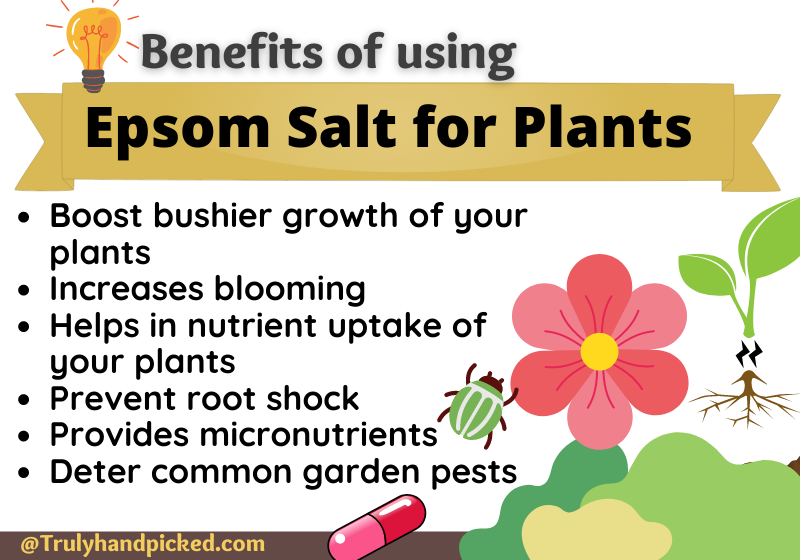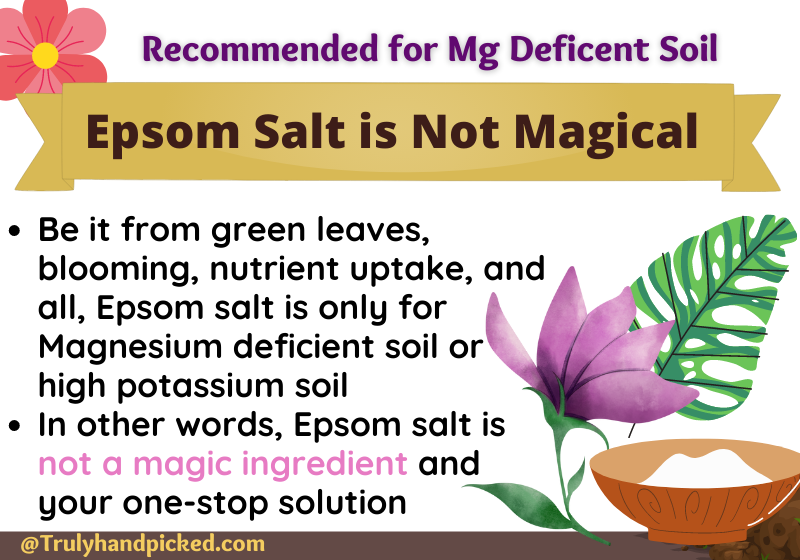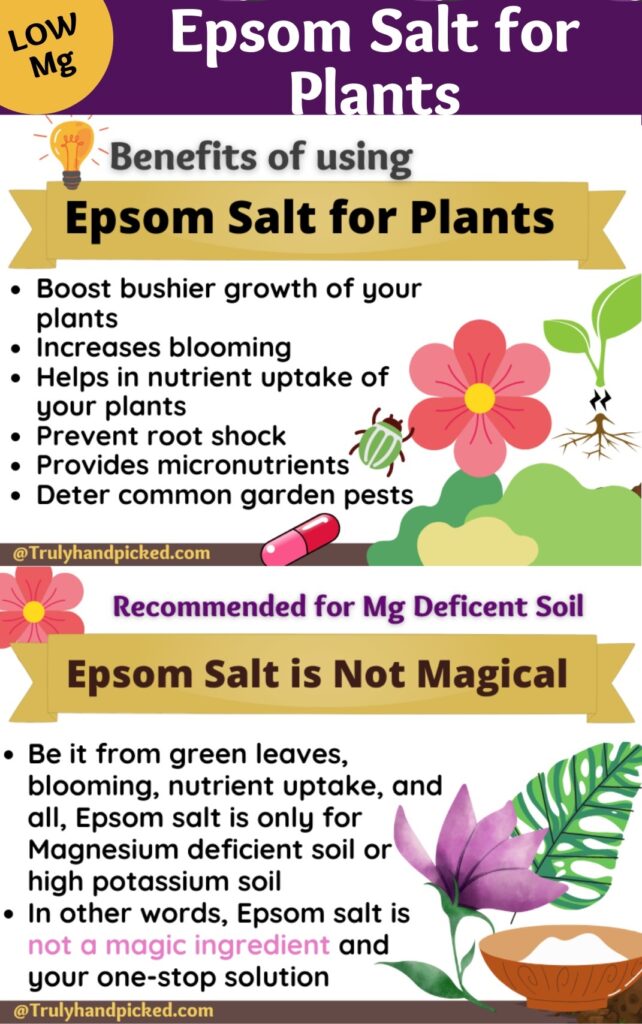Using Epsom salts on plants is one of those best organic methods several gardeners have been applying for centuries. Some new-age gardeners frequently show their inquisitiveness about this ancient method.
Epsom salt for plants: Apart from nourishing your plants with micronutrients, it helps in bushier plant and greenish leaves, better blooms in flowering and vegetable plants, helps in easy nutrient uptake and prevents common pests.
Don’t use Epsom Salt: Too much Epsom salt can hurt your plant if the soil already has sufficient, use only when you know your soil is magnesium deficient.
Using Epsom salt: For 1-gallon water mix 2 Tbsp of Epsom salt and water your plants once a month with this solution.
Epsom salt is not a complete fertilizer, but it’s loved by plants like tomatoes, peppers, and rose.
But the question is that, does it really work? Are Epsom salts beneficial for the overall health of garden plants? Well, we will validate those answers in our article below along with the other detail related to this topic.
So, let’s find out some must-known facts about Epsom salt and its usage to find out, how to enhance your gardening experience organically-
Why Should We Use Epsom Salts on Plants?
Epsom salts leave many good effects on plants including making your gardening experience easier. Some of the highlighted advantages Epsom salts can do to your plants are like-
- Boost the growth of your plants
- Improve the blooming capacity of your plants
- Make your flowering plants bushier
- Enhance the green shade of the foliage
- Make the blooming of vegetable plants faster
- Can prevent root shock of some of your garden plants
- Help your plant to grab some essential nutrients like nitrogen or phosphorus more easily
- Deliver micronutrients to your growing plants
- And help to deter some common garden pests naturally
- Provide progress in the process of nutrient uptake of your plants
You just need to learn the perfect timing and using details before applying Epsom salts on your plant to get the beneficial outcome to the utmost.
Indoor or Outdoor Plants: Where Do Epsom Salts Work Best?
Epsom salts work well on both types of houseplants. The benefits of using Epsom salts on plants can vary by the quality of your planting soil, not on the place of plants. If the soil of your garden bed or planter has sulfur magnesium deficiency or nutrient deficiency, or stunt growth, etc. then, you can apply Epsom salts anytime on them, to treat the issue organically.
Also, check for ways to increase your soil Ph for better nutrient uptake.
How to Apply Epsom Salt on Plants?
To get the best consequence of using Epsom salts on plants, you must be clear in your mind about the reason you are using Epsom salts for. The applying method always varies depending on that. Let’s see how to use Epsom salts on plants differently to treat different kinds of problems-
when to use Epsom salt?
Following are only suggested if there is a magnesium deficiency in your soil otherwise all will turn out to be a myth rather than a miracle.
Issues like pale leaves or low blooming and other similars linked to magnesium deficiency can alone be addressed by Epsom salts. In other words, Epsom salt is not a magic ingredient and your one-stop ingredient.
Epsom Salt for Enhancing Leaf Quality:
Using Epsom salt can make shrub of your bushier and foliage shinier. To get this facility, you need to follow these instructions-
- Dilute Epsom salt in water by mixing 1 cup of Epsom salt in per gallon of water
- Now, use the water to rinse the bushes and foliage of your plant thoroughly
- You can soak unplanted bushes into this mixture either to get the same benefit
Apart from this to make your plants grow leaves learn about ways to increase nitrogen in soil and compost.
Epsom Salt for Boosting Blooming:
Epsom salt can boost the booming capacity in your houseplants efficiently due to its powerful properties. To get this advantage, try this applying method-
- Use ½ cup of the starch form of Epsom salt in this attempt
- Mix this starch directly into the planting soil at the base of your garden bed
- Now, plant any flowering plant into that soil and you will see the amazing result soon
Epsom Salt for Improving Crops:
Applying Epsom salt can make the capacity of producing crops faster in some vegetable plants. This solution can improve the quality of vegetable crops also, like tomato or pepper plants. The usage method is mentioned below-
- Sprinkle 1 tbsp of Epsom salt around each plant of these vegetables
- You need to use the granulated form of Epsom salt in this attempt
- Otherwise, combine 1 tbsp of Epsom salt in 1 gallon of water and use this mixture for watering your plant
- Try this method especially during the first blooming session to get the most effective result
Epsom Salt for Boosting Growth:
The richness of magnesium and sulfate makes Epsom salt a great compound to take care of your garden plants expertly. The best quality of Epsom salt is that it can boost the overall growth of a plant. Let’s see how to use it for this purpose-
- Mix 1-2 tbsp of Epsom salt in 1 gallon of water
- Combine them well to let the Epsom salt dissolve in the water smoothly
- Pour it in a watering can and use this mixture to water your plant thoroughly
- You need to repeat this process after 2-4 weeks depending on the number of plants you have in your garden.
Epsom Salt for Treating Stunt Plants:
If your houseplants stop growing or start having root problems, you can use Epsom salt to treat such issues as well. The proper way of using Epsom salt to treat root issues is-
- Add 1 tbsp of Epsom salt directly in each planting hole during the timing of the plantation
- You can use Epsom salt diluted water also to water the root thoroughly to get the same benefit
- Repeat this method after every few weeks to solve the root issue shortly
Epsom Salt for Nourishing Soil:
Epsom salt not only provides inside nutrient to your plant but also lend a hand to grab some essential nutrition from the applied fertilizer. It also helps to balance the nutrition level in soil expertly. To get this facility, you need to use Epsom salt this way-
- Drizzle a moderate layer of Epsom salt over the garden bed or your planting soil directly
- Try to keep the measurement like using 1 cup of Epsom salt in 100 square fits of area for outdoor garden
- You can try ½ tbsp of Epsom salt for each plant to nourish indoor plants in planters
- You can use the diluted form of Epsom salt in purpose if you want.
Epsom Salt for Controlling Pests:
Epsom salt could act as a natural pesticide alternative and protect our plants from pests like slugs, snails, etc. if you use it accurately. The applying methods are right below-
- Take 1 gallon of water in an empty spray bottle
- Add 1 tbsp of Epsom salt into it
- Set the lid and shake the bottle several times until you find that Epsom salt dissolves completely
- Now, rinse your plants with this mixture head to toe with a thick layer
- Spread the Epsom salt mixture on the infected stem and leaves thoroughly
- Repeat this process regularly until you get rid of those stubborn pests entirely.
Learn more about ways to get rid of mealybugs and know what do fungus gnats look like?
Which Plants Like Epsom Salts The Most?
Some plants thrive more healthily with the help of Epsom salt than their other alternatives. Plants with high magnesium need to do well with Epsom salt. Some common plants, which like Epsom salt the most are-
- Rose
- Tomatoes
- Pepper
Plants That Don’t Like Epsom Salts:
Epsom salt act beneficial for the utmost plants, whether it is a garden plant or indoor houseplant. Only a few of them don’t stand this magnesium sulfate happily. Plants with low-magnesium need mostly don’t like Epsom salt during the growing or blooming or cropping session. Beans and leafy vegetables are some of those plants.
The Pinterest image on Epsom salt for Plants
FAQ: Epsom Salt For Plants
Epsom salt pH?
Epsom salt is not acidic or alkaline and it falls under pH neutral.
Will Epsom Salts Kill Maggots?
Epsom salt can kill any soft-bodied insects and thus, is effective in killing maggots too.
You may also be interested to know how Epsom salt helps to kill aphids.
Can Too Much Epsom Salts Hurt Plants?
The high amount of magnesium sulfate can bring salt injury to your plants. Thus, excessive use of Epsom salt can make the growth of your plant worse instead of enhancing them naturally.
Does Epsom Salts Kill Bugs in Plants?
Like normal white or table salt, Epsom salt can easily kill normal bugs like beetles and repel them from your garden effectively.
What Exactly is This Epsom Salt?
Epsom salt is a chemical compound made of magnesium sulfate with a bit amount of oxygen. This is not the normal table salt we use for cooking, however, it pauses a similar look like table salt tough. This chemically made salt belongs to a town in England, where it was discovered hundreds of years ago.
It has got its name from that native place Epsom, a small town in Surrey of England. People start using Epsom salt to treat several chronic health issues and body aches, after noticing its miraculous healing properties. One can treat any plant issue either with this incredible salt. You can find this amazing organic salt in any medicate store near you.


